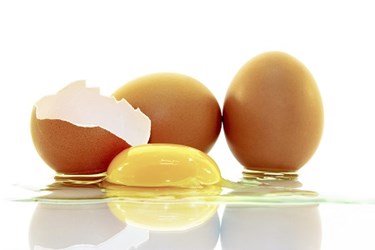What "Unboiling" An Egg Can Mean For Cancer Drug Development
By Anna Rose Welch, Editorial & Community Director, Advancing RNA

In a strange and exciting twist, researchers from the University of California, Irvine (UCI) and Flinders University announced this week they have discovered a new way to “unboil” a hen’s egg — a task that could have huge ramifications for the biotech industry as it races to get cancer meds to patients faster, CNET reported.
“Unboiling” an egg is far from a new concept. It was originally discovered by Hervé This, a famous French chemist known for some of the wacky discoveries he’s made while experimenting with food. When an egg is boiled, heat causes the protein’s amino acid strings to join together and envelop water molecules, causing the egg to harden. In order to unboil the egg, these proteins need to be detached from one another, which can be done by adding sodium borohydride or, if you’re performing the experiment at home, vitamin C. Within three hours, the eggs will once again be liquid.
While it’s certainly an interesting bit of science, there hasn’t been any practical use for this little experiment beyond inspiring awe. But this new research from UCI and Flinders has uncovered a way of unboiling and restoring lysozyme, a specific protein in egg whites — a process that holds promise for a cheaper cancer drug manufacturing process.
According to Gregory Weiss, UCI professor of chemistry, molecular biology, and biochemistry, the team used a specific device that “pulls apart tangled proteins and allow[s] them to refold. We start with egg whites boiled for 20 minutes at 90 degrees Celsius and return a key protein in the egg to working order."
Proteins often “misfold” and become unusable, CNET reported in their article. However, Weiss’ work recycles or creates usable proteins in minutes, compared to the four days it takes for dialysis (the current approach to restore denatured proteins).
Adding urea to the albumen causes the solid egg whites to liquefy, however, because the proteins are still tangled up, they remain unusable. Researchers at Flinders University learned that spinning the egg whites in a high-speed vortex fluid device will cause the amino acids to return to their originally untangled state.
It’s still a neat scientific concept to read and tweet about. But this time, it has practical applications for pharma. This new technique — currently called the urea technique — could be a much cheaper method of manufacturing cancer antibodies, currently carried out using costly hamster ovaries. This could also mean that cancer drugs will be more affordable for patients when they enter the market, which, considering all the hype over high drug prices today, could be welcome news for companies and patients alike.
You can read the full paper, “Shear-Stress-Mediated Refolding of Proteins from Aggregates and Inclusion Bodies,” here.
